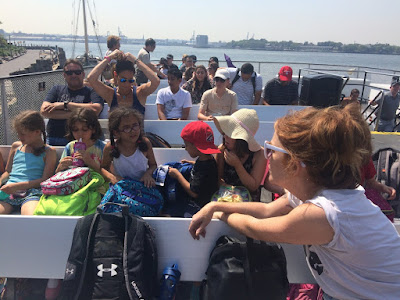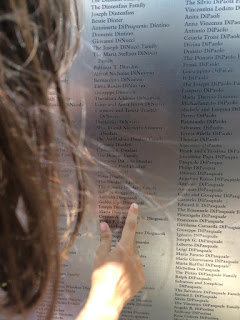Today marked our penultimate day and easily our most ambitious: a field trip to Ellis Island! Usually by Thursday, our kids are well-versed in Elm Tree rules, having established bonds and a sense of mutual responsibility for each other, which makes it the perfect point in the week to take a trip out of the park.
All the kids arrived first thing in the morning, minus our dear poet, Enid, who was sorely missed as we set off on our adventure for the day. We hopped on the train and headed to the ferry, where we met Rod's friend and our visiting artist for the day, Hoyce (Julia Joyce-Barry). On the train ride over, we started the kids thinking about the concept of a name, which was very much the theme of today's writing assignment. What's in a name? What does it mean to change it? What does it mean to carry it with you? (A quick little history of the name Hoyce: Rod dubbed Julia, one of his closest friends, Julio, which lead to a completely ridiculous new name: Julio Hoyce-Barry—eventually just shortened to Hoyce.)
Soon after, we untied with Hoyce and it was love at first sight! We did our classic intro (which you'll hear at the reading tomorrow at 5:00pm at Unnameable Books), and Hoyce did the same before we headed off onto the ferry, which is always an adventure onto itself. We marched up to the top of the boat, in "two straight lines, Madeline" (Romy's catchphrase), and had some snacks as we set sail on the Lady Liberty. On our way, the kids grasped onto the banister and screamed, "ahoy!!" to any boat within range (which was any boat), and most people waved back!
After that, the kids headed over to a digital directory of immigrants who passed through Ellis Island. Some of our kiddos had family members who immigrated into New York, so we took some time to search for them. Jacie mentioned that her great-grandmother, Beatrice Schiffman, came to Ellis Island "because she was Jewish", which Romy echoed as true for her family as well. Maren's great-grandfather, Jerome Dioguardi, also immigrated just after World War II. Lyla's grandparents, the Lasovskis, also passed through! Most of the first and last names were not listed, but we were able to track down everyone's last name, and make our way to the wall to see its engraving. The kids were extremely excited to see their relatives on this wall, the history of their family collapsed into one moment. Maren held her finger to her family's name.
When they came back, we gave them a prompt to start off with it. The poem started off in the form of a letter, with "Dear (name)", followed by "I hope you / but I'm worried that". The poems really asked the kids to examine the micro and the macro, and to imagine the experience of an immigrant entering a strange land, which the kiddos are lucky to consider a home. We reminded them that they live in New York City, one of the most culturally rich cities in the world and to share this privilege with the person they're welcoming into their home.
by Audrey
by Lyla
by Oona
by Maddie
by Gayatri
We hopped on the ferry back to Battery Park, where we bid adieu to Hoyce after a day spent gallivanting around the grounds with her. When it was time to part, the kids ran and bombarded her with the biggest hug Romy and Rod had ever seen. They thanked her for her kindness, her humor, and her tattoos. Hoyce, in response, thanked them for their generosity and willingness to accept an outsider into their makeshift family. The essence of accepting others felt embodied by her presence and our kiddos' openness.
Thank you, Hoyce!
Please refer to the email for details on tomorrow's (Friday's) reading at Unnameable Books. We really hope to see you all there, after our last day of the Elm Tree Poetry Program.
With a heavy but full heart,
Romy & Rod




































No comments:
Post a Comment